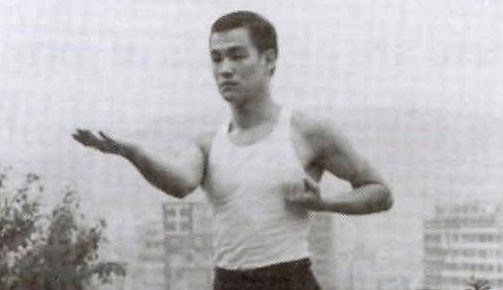(Durante o treino regular semanal, Eduardo ataca com um roundhouse kick, enquanto eu cubro com Kwan Sau avançando)
(During regular weekly training, Eduardo strikes with a roundhouse kick, while I cover with Kwan Sau advancing)
Muitas vezes, sou abordado por meus alunos/parceiros de treino com uma frase bem recorrente;
- ''Dido, eu não tenho tempo pra treinar quando não estou vindo para as sessões regulares. Sinto meu desenvolvimento lento. Como posso fazer para ter um aproveitamento melhor?''
Often, I am approached by my students / training partners with a very recurrent phrase;
"Dido, I do not have time to train when I'm not coming to regular sessions. I feel my development slow. How can I do to have a better use? ''
Não é diferente; Essa é uma tendência comum acreditar que a prática em momentos programados pode não ser o suficiente. Mas mesmo as prática em momentos oportunos ( fora da programação regular e treino) também podem não ser o suficiente. Na verdade, o ideal é conjugar tanto os momentos de prática regular quanto nos momentos onde a oportunidade de exercitar um determinado aspecto do sistema aparece.
A ideia de lentidão de desenvolvimento não é algo incomum. Muitas vezes, eu mesmo sinto que não estou desenvolvendo bem uma determinada ideia, conceito ou mesmo algum movimento em específico. Na verdade, não importa, de todo. A grande questão é que se você não praticar nada, não conseguirá chegar onde quer e muitas vezes, o imediatismo, a pressa, o desejo de chegar num ponto onde queremos estar e que parece tão distante de nós, muitas vezes só atrapalha.
Is no different; This is a common tendency to believe that practice at scheduled times may not be enough. But even practice at the right time (outside of regular programming and training) may not be enough. In fact, the ideal is to combine both moments of regular practice and moments where the opportunity to exercise a certain aspect of the system appears.
The idea of slow development is not unusual. Often I feel that I am not developing a particular idea, concept or even some specific movement. It does not really matter, at all. The big question is that if you do not practice anything, you will not be able to get where you want and often, the immediacy, the rush, the desire to get to a point where we want to be and that seems so far from us, often only disturbs.
Por isso mesmo que relaxar, tirar o peso da mente e não ''bitolar'' com a ideia obsessiva de querer ''ter'' aquela técnica tão almejada ou o entendimento pseudo-superior marcial ( ou qualquer besteira dessas) é o primeiro passo. O segundo passo é mais simples ainda; Entender que aquele básico que você ACHA que já dominou, que parece ''fácil demais'', ou que você já viu um milhão de vezes, é exatamente aquele que você mais deve investir, dispender mais tempo praticando e que isso é o que fará você alavancar quando tiver algo ''advanced'' para aprender...Vai parecer que você já fazia aquilo desde quando criança...
SiFu sempre me disse que - ''Um bom básico, fará um bom avançado!''
E nisso eu entendo que aproveitar o seu tempo nesses básicos vale muito mais do que tentar fazer/treinar algo que não se compreende direito. Claro, muitas vezes você quer tentar algo novo, quer testar sua coordenação, seu timimg, mas isso não deve ser o motivo principal e nem o motor para que você avance na arte. Talvez funcione mais como um ''preview'', mas ainda sim, se você não tiver a consciência de que tudo que você pratica tem a finalidade de criar ''hábitos'', isso irá lhe prejudicar de alguma forma.
For this reason, even if it is relaxing, to take the weight of the mind and not to "bite" with the obsessive idea of wanting to "have" that long-sought technique or pseudo-superior martial understanding (or any such bullshit) is the first step . The second step is simpler still; Understand that the basics you think you've mastered, that seem '' too easy, '' or that you've seen a million times, are exactly the ones you should invest the most, spend more time practicing and that's what you'll do you leverage when you have something 'advanced' 'to learn ... It will seem like you've done it since you were a child ...
SiFu always told me that - '' A good basics, it will do a good advanced ''
And in this I understand that enjoying your time in these basics is worth much more than trying to do / train something you do not understand right. Of course, many times you want to try something new, either test your coordination, your timimg, but this should not be the main reason or the engine for you to advance in the art. It may work more as a preview, but still, if you are not aware that everything you do is meant to create 'habits', it will hurt you in some way.
Nada é mais comum entre praticantes regulares de kung fu que não tem disponibilidade de prática em momentos que não sejam os oportunos do que a falta de tempo e essa é a desculpa preferida que 90% dos caras usam para não treinar ou abandonar escolas. Mas, sempre há um jeito de se fazer as coisas e muitas delas, só a vontade de querer fazê-las, não é suficiente. Mas uma de minhas frases favoritas é ; Quando se quer, se faz! Pouco importam as circusntâncias,quem quer, dá sempre um jeito, ou pelo menos, tenta, terá a mesma validade,pois o empenho,a atenção e o zelo estará lá.
Sendo assim, algumas idéias de como praticar ou manter-se em atividade que possam ajudar no desenvolvimento daquele pequeno básico, que aparentemente não tem muita importância, mas que na verdade é TODO O DIFERENCIAL, podem ser colocados em prática agora mesmo, enquanto você está lendo essas tortas linhas...
Nothing is more common among regular kung fu practitioners who do not have practice availability at times that are not timely than lack of time and this is the preferred excuse that 90% of guys use not to train or drop out of school. But, there is always a way to do things and many of them, just the will to want to do them, is not enough. But one of my favorite phrases is; When you want, you do it! No matter the circumstances, whoever wants, always gives a way, or at least tries, will have the same validity, because the commitment, attention and zeal will be there.
So, some ideas of how to practice or keep up that can help in the development of that little basics, which seemingly does not matter much, but which in fact is ALL THE DIFFERENTIAL, can be put into practice right now while you are reading these poorly drawn lines

- Ao menos uma vez ao dia, pratique o Siu Nim Tau ( Ou se você não pratica Wing Chun mas outro estilo, pratique a forma mais básica que você conheça),ou algum exercício isolado como treino de base, troca de guarda,etc, sempre que tiver chance.
- Ao vestir uma calça, ou amarrar seus sapatos,por exemplo, treine seu equilíbrio, permanecendo em uma perna só, evitando ficar sentado para fazê-lo.
- Ao caminho para seu trabalho, estacione seu carro ou desça no ponto de ônibus um quarteirão antes do seu destino e caminhe um pouco.
• When wearing pants, or tying your shoes, for example, train your balance by staying on one leg, avoiding sitting down to do so.
• On the way to work, park your car or get off at the bus stop one block before your destination and walk a little.
- Alongue-se enquanto estiver sentado em seu escritório ou mesa.
- • Stretch while sitting in your office or table.
- Dê preferência as escadas,ao invés do elevador.
- Choose stairs instead of the elevator.
- Preste atenção ao seu corpo enquanto você dirige, digita ou escreve... ou toma um cafézinho antes do almoço; Repare as partes que se tencionam desnecessariamente e as relaxe.
- Imagine, onde quer que você esteja, que subtamente você está sendo atacado; Que tipo de reação você teria?
- O que você poderia fazer e não está fazendo, a partir deste exato ponto para antecipar e evitar uma situação de conflito? Como seu corpo está posicionado agora?
• Pay attention to your body as you drive, type or write ... or have a cup of coffee before lunch; Repair the parts that are unnecessarily intended and relax them.
• Imagine, wherever you are, that you are subtly attacked; What kind of reaction would you have?
• What could you do and not do, from this exact point to anticipate and avoid a conflict situation? How is your body positioned now?
Apesar de tudo, essas são pequenas atitudes que podem ajudar a não deixar o corpo e a mente ''parados''. Lembre-se que a prática formal ainda é o melhor caminho e que aquele clichê que diz que uma longa jornada começa com um simples passo, é verdade sim.
Façamos o seguinte; Porquê GASTAR tempo se podemos APROVEITAR o tempo, hãn? Invista pacientemente em seu Kung Fu e procure entender que isso fará uma diferença enorme e epero, traga á você amigo leitor, bons resultados...Talvez não hoje, não amanhã...talvez você nem perceba quando, mas quando menos perceber, já estará onde sempre quis estar.
After all, these are small attitudes that can help to keep the body and mind "standing still." Remember that formal practice is still the best way and that cliché that says a long journey starts with a simple step, it is true.
Let's do the following; Why SPEND time if we can take the time, huh? Invest patiently in your Kung Fu and try to understand that this will make a huge difference and yet, bring you friend, good results ... Maybe not today, not tomorrow ... maybe you do not even know when, but when you least notice it, already will be where I always wanted to be.

Dido
Discípulo particular do SiFu Marcos de Abreu em PE
Particular disciple of SiFu Marcos de Abreu - PE











